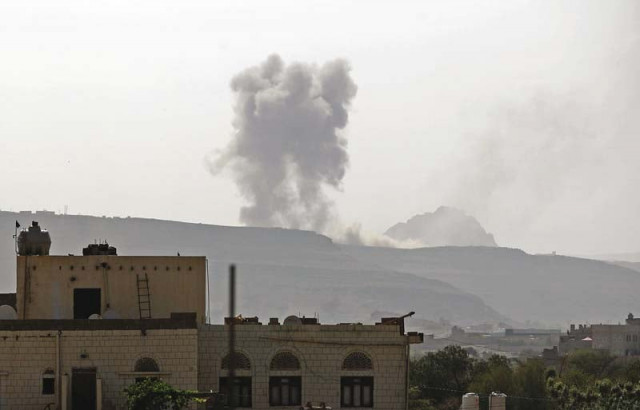Saudi strikes hit homes, markets in Yemen: Human Rights Watch
Reports says at least 59 people had died in a month, from April 6 to May 11, including 14 women and 35 children

PHOTO: AFP
The US-based rights group said it had investigated the attacks on the northern city of Sadaa and found that at least 59 people had died in a month, from April 6 to May 11, including 14 women and 35 children.
Satellite imagery showed over 210 strike sites in the city, a stronghold of the Shia Houthi rebels, damaging or destroying hundreds of buildings, said the report.
New @hrw report documents civilian harm from Saudi-led airstrikes on #Yemen's #Saada City: http://t.co/2FUPXjW6lK pic.twitter.com/5EI0UA8Wgg
— Mary Wareham (@marywareham) June 30, 2015
Six houses were hit in Saada, as were an empty school, a cultural centre, five markets and a petrol station crowded with motorists, according to the report.
In one of the deadliest incidents, a bombing raid on May 6 killed 27 members of one family including 17 children.
Attacks on houses alone have killed 51 people, all of them civilians, according to Human Rights Watch, which dispatched two researchers to the city last month to interview witnesses.

People are pictured through a damaged window of a house near the site of a car bomb attack in Sanaa June 30, 2015. PHOTO: REUTERS
Belkis Wille, one of the researchers, said "Yemen has been absolutely brought to its knees in this war."
Once a city of about 50,000, Sadaa has been turned into a "ghost town" as a result of the air war, which has seen northern Yemen hit hardest by the bombings, she told a news conference.
Coalition authorities last month declared all of Saada to be a military target and warned its residents to leave.
"You cannot decide that an entire area is fair game," said HRW's crisis advocacy director Philippe Bolopion.
Civilians many not be able to leave, due to fuel shortages, he added.
"Not only were these attacks unlawful because of the apparent absence of any military target, but they contributed to civilian hardship in the city, where people are suffering from shortages of food, water, and fuel," said the report.
The nine-nation Saudi-led coalition launched air strikes on Yemen on March 26 to halt an advance by the Iran-backed Houthis who drove the president into exile.
Read: Shelling by Yemeni group kills four soldiers on Saudi border
Saudi Arabia and its Gulf allies are demanding that the Houthis pull back from territory seized in their offensive and that President Abedrabbo Mansour Hadi be restored to power.
A week of UN-brokered talks in Geneva earlier this month failed to narrow differences.
Human Rights Watch called on the coalition to investigate the attacks to determine whether they constitute a violation of international humanitarian law.
The rights group cautioned that it had not found evidence that the coalition deliberately targeted civilians, but said the coalition's declaration that all of Saada was a target was illegal.
Andreas Krieg, a consultant to the Qatar armed forces and a lecturer at King's College in London, said the coalition was seeking to avoid civilian casualties.
Many civilians have been killed because of the terrain which includes inaccessible valleys and cities, said Krieg.
Read: 28 dead in attack on Shias in Yemen claimed by IS
He stressed that the Houthis "use civilians as human shields" by hiding among them.
HRW researchers who travelled to Saada reported that they saw Houthi vehicles mounted with anti-aircraft weapons.
UN Secretary-General Ban Ki-moon has demanded a full investigation after Saudi coalition air strikes hit a UN compound in the southern city of Aden on Sunday, injuring a guard and seriously damaging the building.



















COMMENTS
Comments are moderated and generally will be posted if they are on-topic and not abusive.
For more information, please see our Comments FAQ